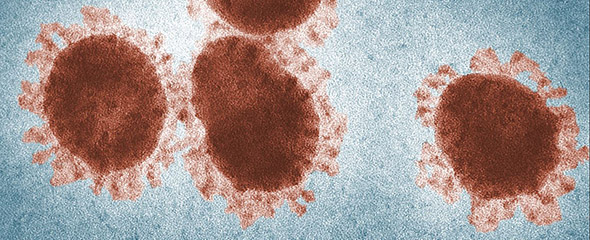Professor Heinz, a contact ban has been in effect in Germany since 23 March to slow down the spread of the novel coronavirus SARS-CoV-2. How sensible is this measure in your view?
I currently regard the restriction of social contacts as a very important measure to give hospitals time and to avoid intensive care units being overrun by too many seriously ill patients. Even if this is very difficult for many in everyday life, everyone should stick to it if possible.
Should the contact ban have been issued earlier?
When the number of infected persons in Italy rose rapidly in February and more and more died of COVID-19, it became apparent that Germany would soon be massively affected as well. At that time, however, many people in Germany would probably have considered such drastic measures as a contact ban to be over the top. Now people in this country are aware of the importance of this measure, so I think the time is right. Apart from restricting social contacts, it is essential that we focus on other areas: In particular, we have to protect people who are at high risk of becoming ill or dying if they become infected. These are mainly the elderly, immunocompromised and patients with pre-existing conditions. It is also essential that the medical care capacity for the seriously ill is further strengthened and that the medical staff are protected as best as possible against infection. There is currently a shortage of adequate respiratory masks and other protective equipment. This bottleneck urgently needs to be remedied. If the medical staff are not available, seriously ill patients can no longer receive the best possible care.
What could such support look like?
At this point, politicians must ensure that the existing protective equipment is not suddenly sold overpriced. In addition, companies that are currently shutting down their operations and still have large numbers of protective masks could donate them to the clinics now. For example, the HZI is providing the Klinikum Braunschweig with PCR machines and the personnel required to operate them in order to create additional capacity for coronavirus testing. In response to an appeal we launched, the Technische Universität Braunschweig is now also participating in the project.
How is the HZI setting up its research on SARS-CoV-2?
At the HZI, we are set up so that we can react quickly to current infection events. For example, we have focused our existing virological, chemical and epidemiological expertise strongly on SARS-CoV-2 now. The scientists in our epidemiology department have expanded the digital disease management tool SORMAS, which is based on mobile radio technology, with a module for the detection of corona outbreaks. The head of our epidemiology department, Gérard Krause, is currently working to roll out SORMAS in German health authorities. With our drug discovery platform, we are intensively searching for a drug to combat the novel coronavirus. In our safety laboratories, virologists are testing the effectiveness of such substances on real coronaviruses that we have received by now. In the future, we will also be examining serum samples from patients who have already survived COVID-19 disease. They have produced antibodies we can use to determine whether these people are immune. At the moment, we assume that you cannot be infected twice with SARS-CoV-2. The HZI is now coordinating a large-scale population study with well over 100,000 subjects in order to get a more precise picture of immunity and pandemic development.
Is the HZI now becoming a "coronavirus centre"?
In the current extreme situation it is important to do everything we can to cope with the pandemic in order to overcome the corona crisis as quickly as possible. HZI researchers are involved here in an admirable manner and with many highly innovative approaches. However, this implies in no way that our previous research priorities, for which we have only recently received international recognition in a review, no longer play a role. They are by no means losing their importance, but are now being supplemented by another focus - coronavirus research.

